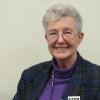St. Joseph Srs. Rosemary Flanigan and Barbara Moore (Sarah Baker)
I commemorated the 55th anniversary of the 1965 march from Selma to Montgomery, Alabama, early this year with two "Sisters of Selma." On Feb. 29, 170 sisters, associates, staff and guests gathered at St. Teresa's Academy, the oldest school in Kansas City, Missouri, which is sponsored by the Sisters of St. Joseph of Carondelet.
St. Joseph Srs. Rosemary Flanigan and Barbara Moore shared their memories of those days, which marked a turning point in U.S. sisters' engagement in the civil rights movement.
Sister Rosemary, still a dynamo at 93, had been watching TV with her sisters on March 7, 1965 ("Bloody Sunday"), when they saw, for the first time, images of American citizens being beaten over their right to vote in Alabama. (Of 15,000 black citizens in Selma, only 300 had been able to register.)
After that, things happened fast.
The Rev. Martin Luther King Jr. immediately called on religious people to come march in defense of civil rights. A Sister of Loretto said, "What, no sisters?" and soon, six sisters — two each from the Sisters of St. Joseph of Carondelet, the Franciscan Sisters of Mary and the Sisters of Loretto — were recruited from the Midwest to go with a group of 48 other people, mostly men.
Flying down to Alabama on March 10, 1965, Rosemary found herself seated next to the dean of a law school in St. Louis. She asked him about the controversial test that was being used to suppress the black vote. He said, "Sister, I could not pass that test!"
When they arrived in Selma, they were told, "You won't walk far," and faced a phalanx of sheriffs and the Alabama State Defense Force. Looking at the armed men, one of the visiting group members quipped, "Don't get a ticket in Selma!" They knelt to say the Our Father and went to a hospital operated by the Sisters of St. Joseph of Rochester for a meal, then flew home the same day. Coming back, Rosemary was so overwhelmed by the feeling of solidarity in the group of so many religions and races that she just knew racism was dying.
Sister Barbara, who was in 1955 the first African American to join her community, was working as a nurse in a hospital in Kansas City when she was asked to go to Selma with another group that left on March 12, 1965. It was then she started thinking that Cardinal Joseph Ritter of St. Louis should be canonized for his role in mobilizing religious to go down. She said her group carried a suitcase holding $25,000 provided by a lay donor to cover their bail in case they needed it.
Arriving in Alabama, she was shocked to see people standing on their porches with shotguns and more armed men in the back of pickup trucks. But she was amazed at how diverse the protest group was — and how disciplined. The organizers taught the demonstrators nonviolent strategies to use when they were arrested, and she said they gave her particular attention.
"Now, Sister, you understand if you are arrested [because you are black], you will not be put in the same cell as the other sisters, is that OK?"
She said she replied with a weak yes.
Though she was not injured, she was upset about being booed. A couple of days after returning home, she was hit forcibly by the conviction that she could have come home "in a box."
Less than two weeks later, on March 21, 1965, sisters from all over the United States went to Alabama to participate in the march from Selma to Montgomery. Rosemary said when the future U.N. Ambassador Andrew Young saw the sisters coming in, he said, "Here is the greatest moral force in our country."
Historian Carol K. Coburn, a professor of religious studies and women's and gender studies at Avila University in Kansas City, was present for the sisters' presentation. She noted that in 1965, approximately 75% of the sisters present in Selma were from Midwestern states, and that this event really marked the beginning of sisters' movement into social justice and systemic change. Coburn told me: "This percentage is based on the data available — but as you would expect, clergy got exact counts. Sisters did not get fully recorded."
A Sister of Charity of the Blessed Virgin Mary from Kansas City was the only sister to walk the complete 54-mile distance in the final march. One of my own Ursuline sisters and another professor from Brescia (our university in Kentucky) walked for a day in that third Selma march and had similar experiences. We were proud to welcome them home and to learn that they had been told they were on the FBI's list of suspected "pinkos" (people suspected of tending toward communism), a badge of honor among liberals in those days.
Sister Rosemary said her own home was the only place where she felt disapproval when she returned; not all of her family members were enthusiastic. At the closing question-and-answer session, she noted that we are all prejudiced in some way. She said those of us who are white need to acknowledge our white privilege. We need to mix with people who don't look or think like us. She laughed at herself as she admitted that she was in her 60s before she had a black friend.
Sister Barbara's advice was: "Don't be silent, don't repeat history." She said she is concerned about the situation today, including gerrymandering and border issues. (She noted: "We have borders in St. Louis.") Her advice is to get involved at the local level, to watch the organizations to which we belong. Our church should be authentic in its preaching, and we should be informed, read everything we can, then make up our own minds. And vote.
Wise advice from some sisters who ought to know.
[Ursuline Sr. Michele Morek is Global Sisters Report's liaison to sisters in North America. Her email address is [email protected].]
Advertisement





